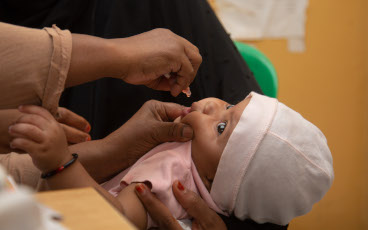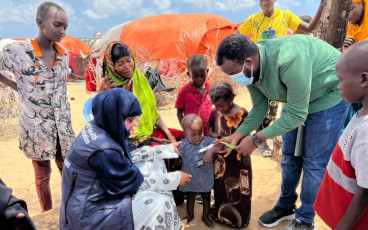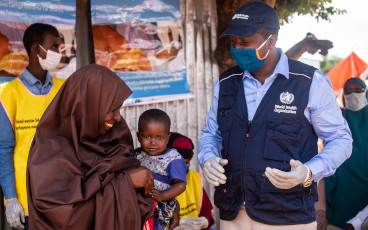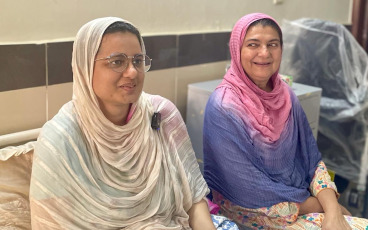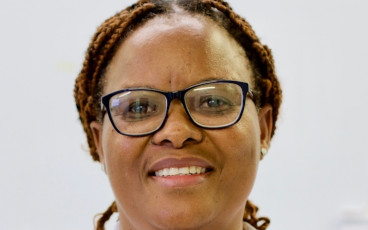Women Leaders in Polio Eradication: Dr. Folake Olayinka
Dr. Folake Olayinka speaks about overcoming gender-related barriers to immunization.
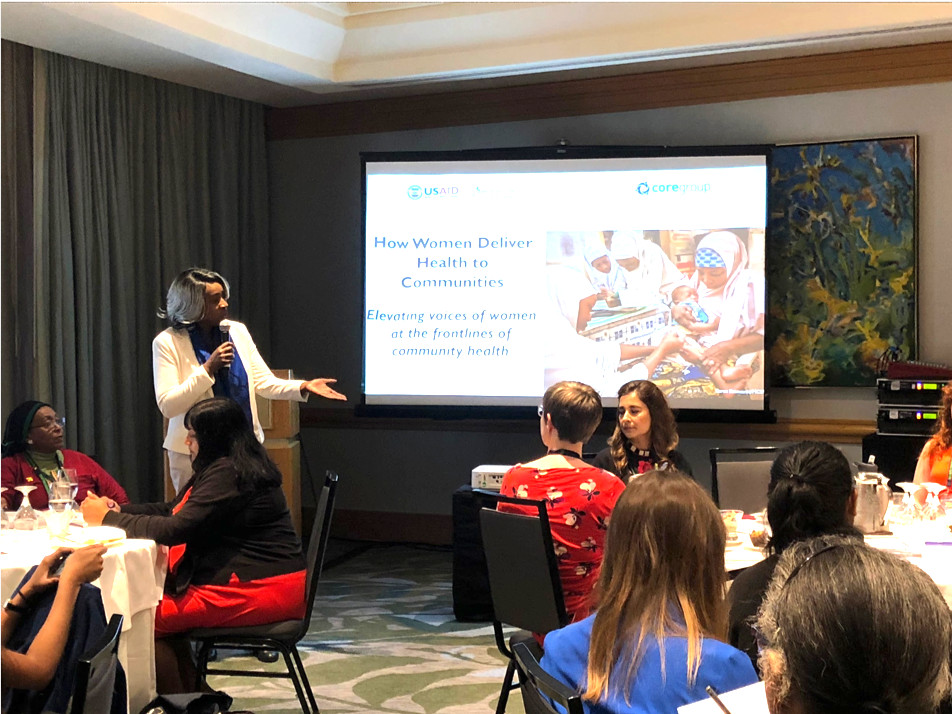
Dr. Folake Olayinka has spent over 20 years working in public health, including at the frontline of efforts to eradicate polio and strengthen immunization.
“At local levels, where the rubber meets the road, we need to make things work. Frontline health workers should be supported with tools that meet their needs, and training that truly values their insights, local innovations and problem solving,” said Dr. Olayinka.
Today, as a global health leader and former John Snow, Inc. (JSI) Project Director for the USAID-funded MOMENTUM Routine Immunization Transformation and Equity Project, she continues to exchange lessons and innovative strategies from the frontlines with other parts of the world impacted by polio and low immunization coverage.
On August 25, 2020, Nigeria, previously the last stronghold of endemic wild polio in Africa, was officially declared free of wild poliovirus. One of the factors contributing to this success was the ability to provide high-quality capacity building and support to improve health workers’ competencies at all levels of the health system.
“The health workers on the frontlines – particularly the community-based workers, many of whom are women – are the backbone of all of these efforts. They operate under incredible circumstances to ensure that their communities have access to life-saving health services,” said Dr. Olayinka.
Dr. Olayinka began working on polio in 2002 in Nigeria. She worked closely with colleagues at the Nigerian Ministry of Health, the World Health Organization, the EU and UNICEF to ramp up health worker training in support of the Nigerian government’s National Program on Immunization.
Her team’s dedication was remarkable. “We were willing to go everywhere to reach the last child. Once I walked four hours to support an immunization team,” she recalls.
Shaking things up
Dr. Olayinka emphasized training quality and the use of feedback to continuously improve the training experience for health workers. She led the development of numerous training guides and materials for polio eradication and developed the country’s first Basic Guide for Routine Immunization Service Providers. She also worked closely with WHO and EU colleagues to develop the first measles campaign field training materials in Nigeria.
Knowing that training of health workers must be continuous, she introduced mentoring as an important post-training approach in Nigeria’s immunization program.
“We needed to move people towards a more interactive approach,” said Dr. Olayinka. “These approaches transfer knowledge while maintaining dignity and recognize that people in the global South have something valuable to contribute.”
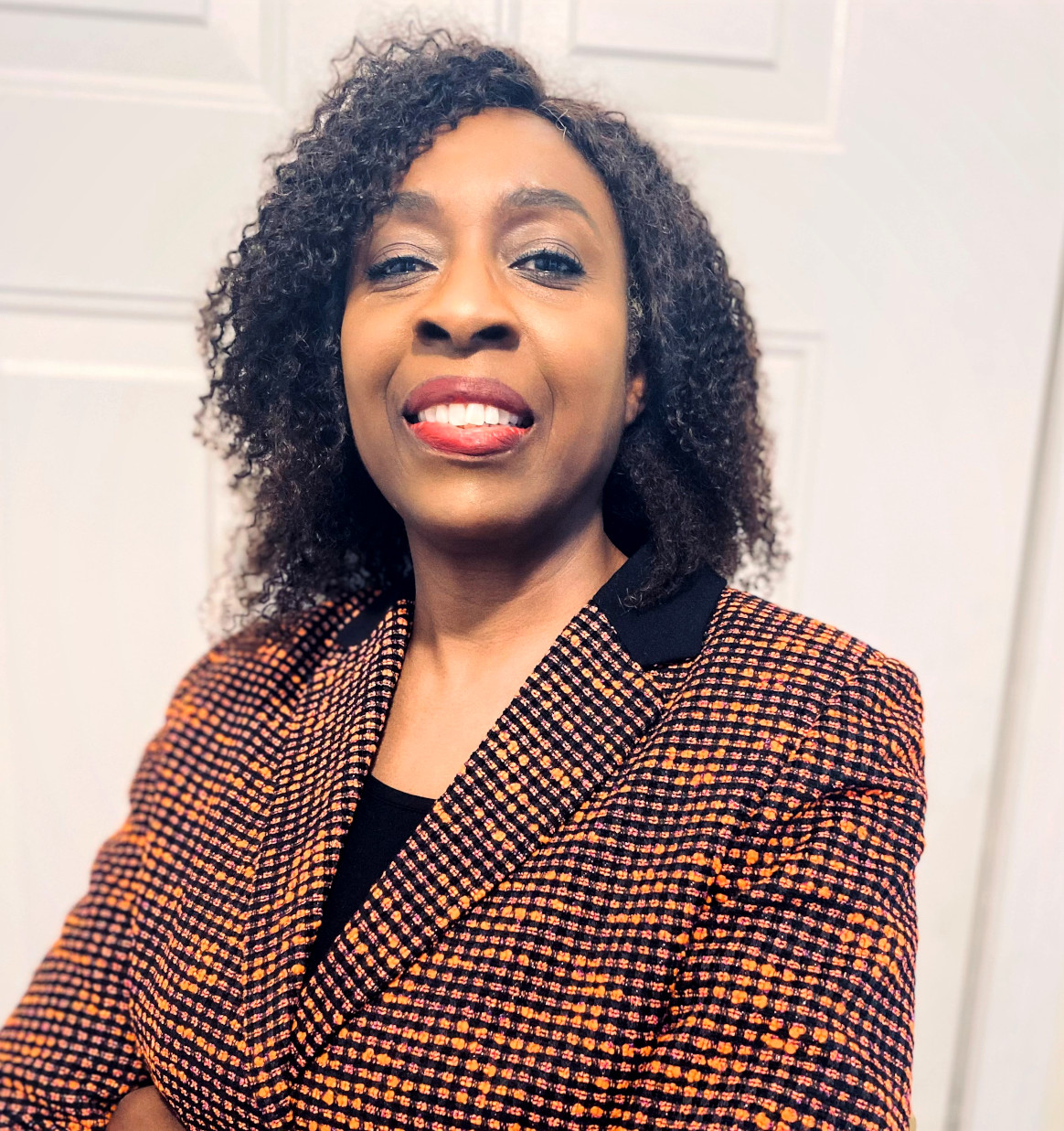
Recalling her experience training different types of health workers and trying to promote adult learning methods, she said, “I once walked into a room of senior health commissioners from all over the country. The room was filled with the usual PowerPoints, and people were not engaged – even sleeping.”
“When I went to the front of the room for my session, I introduced myself using my first name and explained the more interactive approach that I was proposing for the training. At first people were silent, but as the training went on, they really came alive. They were engaged and now identifying the real issues and generating the types of ideas that could truly change policy and improve services – you could see their passion coming through. I felt the ship took a turn.”
Dr. Olayinka also tackled training needs at the community-level and strongly promoted the use of local languages in the training of frontline health workers, particularly social mobilizers for polio eradication.
“At local level in northern Nigeria, most people spoke Hausa; however, training materials were largely in English at the time, and many of the women who were able to enter the homes to provide polio vaccinations did not understand English.”
“The polio programme was at a crisis point and was also facing a lot of refusals. As people in the region were not receiving other basic health services, they began not to trust polio vaccination efforts as it was one of the only services they were receiving.”
A pivot was needed, with a closer examination of what was working – and what was not – for all aspects of the eradication effort.
“These women were looking for the basics: how do I answer questions from caregivers, how do I provide polio drops, how do I enter my data?” remembers Dr. Olayinka “With this insight, I developed a flip chart using pictures – I even included a photo of my own son receiving the oral polio drops. We also used the local languages, role play, peer to peer methods, and songs as part of the training methodology.”
In the area of routine immunization, Dr. Olayinka worked with her team and other partners to introduce a stronger supervision system. The system included a checklist with clear standards for supervision of routine immunization, as well as a checklist on training quality as part of the pre-campaign preparedness. This helped National Primary Health Care Development Agency staff to provide ongoing support and mentorship for health workers. Many of these approaches and materials are still being used today and are updated periodically.
At the heart of the response, you will find a woman
Dr. Olayinka worked in a particularly challenging environment in northern Nigeria. “There are gender dimensions tightly linked with socio-cultural and deep-seeded religious beliefs in the northern state”, she recalled.
Oftentimes mothers had to seek permission from their husbands before they could allow the children to be vaccinated or access health services. “Even when they understood the value, women did not have decision-making power.”
The polio programme was able to reach women in new ways. Men originally started out as polio workers, but it quickly became apparent they were missing children under five because they were not allowed into homes due to cultural norms. The solution: hire women to go door-to-door and reach populations being missed.
“The polio programme brought women out into the workforce in an unprecedented way, says Dr. Olayinka. “Women were powerful mobilizers, particularly older, respected women and could enter any home. The polio programme was one of the first programmes bringing the women out, training them how to speak to other women and community members, which gave them a standing in the community. They also received some stipends which empowered them a bit financially.”
Many of these women later transitioned to supporting broader immunization and other health efforts in their communities, leading to higher child survival rates and less disease in communities.
“This is part of my passion when I talk about integration – these women in the communities, after getting a start from the polio programme, can be trained to talk about routine immunization, use of long-lasting insecticidal nets to prevent malaria, breastfeeding, WASH etc.”
“As a result of the polio programme they have social capital that can be expanded to improve health outcomes in their communities.”
To women leaders of the future
Dr. Olayinka remains committed to elevating the contributions of frontline health workers operating in challenging situations across the world.
When asked what advice she would give to women beginning their careers in public health, Dr. Olayinka said, “Be persistent and do not give up on your dreams. Even where you face discrimination because you are a woman, be focused and persist. Ensure that you are constantly building your capacity and equip yourself.”
“Women at all levels can make a difference, so take the leap—there are no limits to what you can achieve.”


